
Transcription
An Interview With Michael AtiyahMichael Atiyah was born in 1929 and received his B.A. and Ph.D. from Trinity College, Cambridge(1952, 1955). During his career he has been Savilian Professor of Geometry at Oxford (1963-69)and Professor of Mathematics at the Institute for Advanced Study in Princeton (1969-72); he iscurrently a Royal Society Research Professor of Mathematics at Oxford University.Among other honors Professor Atiyah is a Fellow of the Royal Society and a member of the NationalAcademies of France, Sweden, and the USA. He received the Fields Medal at the InternationalCongress of Mathematicians held in Moscow, 1966. His research interests span a broad area ofmathematics including topology, geometry, differential equations and mathematical physics.The following is an edited version of an interview in Oxford with Roberto Minio, former editorof The Intelligencer.MINIO: I think some information about your background might be [valuable]. When did you start getting interested in mathematics? H o w early?ATIYAH: I think I was always interested in mathsfrom a very young age. But there was a s t a g e - - I wasabout f i f t e e n - - w h e n I got very interested in chemistry, and I thought that would be a great thing; afterabout a year of advanced chemistry I decided that itwasn't what I wanted to do and I went back to maths.I never seriously considered doing anything else.MINIO:came over after the w a r - - t h a t was a good school.There were a lot of good pupils there. Then I went toCambridge, and there were m a n y good s t u d e n t saround.I don't think I was particularly influenced by oneperson. But I had a good education, and I had plentyof opportunity to meet good mathematicians; I had agood background in that sense.And that was already noticeable very early?Yes, I think so. My parents always thoughtthat I was cut out to be a mathematician from a veryyoung age, all the w a y through.ATIYAH:MINIO:ATIYAH:But they weren't mathematicians?They weren't mathematicians, no.MINIO: And were you helped at school? Were yourteachers reasonably good with you?Well, I think I had good teachers and myrelations with them were good. I was at school first inEgypt and I went to quite a good school there.ATIYAH:MINIO:Were you born there?No, I was born in England, but we livedin the Middle E a s t - - m y father worked in the S u d a n - so I went to school in Egypt for my main secondaryschooling. I did a couple of years in England when IATIYAH:THE MATHEMATICAL INTELLIGENCER VOL. 6, NO. 1 9 1984 Springer-Verlag New York 9
MINIO:bridge?Did you largely work on your own at Cam-ATIYAH: Well, I came to Cambridge after I had twoyears of National Service: it was a marvellous contrast.Actually, I went to Cambridge a little early in the academic year. I had a summer term there and the lovelyweather and beautiful surrounding made a tremendous impression on me. I used to enjoy just going intothe library to read, being surrounded by all of thosebooks. It was an impressive atmosphere; it capturedmy imagination.There were a lot of very bright students there and Igot reasonable help from the teachers. I don't thinkany of the teachers was particularly inspiring; some ofthe lectures were good and some were not so good.fore hard to be completely expert in. It is very helpfulto have someone else w h o knows a bit more aboutsomething different. So w h e n I work with Singer, forexample, he's much stronger on the analysis side,where I was rather weak, and I know more about thealgebraic geometry and topology.MINIO:ATIYAH: No, no. The collaboration is completely intermingled; we merge our interests and learn abouteach other's techniques. After a while we're more onan equal footing in most parts of the subjects. Ourinterests are very close; it's just that our backgroundsare a bit different.MINIO:MINIO: One of your early papers was with Hodge,is that right?ATIYAH: Yes, that was part of my thesis really. Hewas my research supervisor, and that was very important for m e - - w o r k i n g with him. I'd come up toCambridge at a time when the emphasis in geometrywas on classical projective algebraic geometry of theold-fashioned type, which I thoroughly enjoyed. Iwould have gone on working in that area except thatHodge represented a more modern point of v i e w - differential geometry in relation to topology; I recognized that. It was a very important decision for me. Icould have worked in more traditional things, but Ithink that it was a wise choice, and by working withhim I got much more involved with modern ideas. Hegave me good advice and at one stage we collaboratedtogether. There was some recent work in France at thetime on sheaf theory. I got interested in it, he got interested in it, and we worked together and wrote ajoint paper which was part of my thesis. That was verybeneficial for me.M I N I O : O n e thing that's noticeable is that y o uworked quite a lot with other p e o p l e - - w i t h Singer,with Hirzebruch, with Bott.ATIYAH: Yes, that's right, I work a lot with people,and I think that that's my style. There are various reasons, one of which is that I dabble in a number ofdifferent areas. My interest is in the fact that things indifferent subjects interact; it's very helpful to workwith other people w h o know a bit more about something else and complement your interest. I find it verystimulating to exchange ideas with other people.I've collaborated with many people, some of t h e m - many of t h e m - - o n an extended basis for many years.It's partly my personality, the way I think and interactwith people, and partly because of the kind of mathematics I like doing, which is rather broad and there10THE MATHEMATICAL INTELLIGENCER VOL. 6, NO. 1, 1984Do you then separate out the problems.H o w do you select a problem to study?ATIYAH: I think that p r e s u p p o s e s an answer. Idon't think that's the way I work at all. Some peoplemay sit back and say, "I want to solve this problem"and t h e y sit d o w n and say, " H o w do I solve thisproblem.'" I don't. I just move around in the mathematical waters, thinking about things, being curious,interested, talking to people, stirring up ideas; thingsemerge a n d I follow t h e m up. Or I see s o m e t h i n gwhich connects up with something else I know about,and I try to put them together and things develop. Ihave practically never started off with any idea of whatI'm going to be doing or where it's going to go. I'minterested in mathematics; I talk, I learn, I discuss andthen interesting questions simply emerge. I have neverstarted off with a particular goal, except the goal ofunderstanding mathematics.MINIO:Is that h o w K-Theory emerged?ATIYAH: Yes. It was very much an accident in someways. I was interested in what Grothendieck had beendoing in algebraic geometry. Having gone to Bonn Iwas interested in learning some topology. I was interested in some of the questions that Ioan James hadbeen studying on topological problems related to projective spaces. I found that by using Grothendieck'sformulas these things could be explained, one got niceresults. There was Bott's work on the periodicity theorem; I knew him and his work. Using this I foundthat one could solve some interesting problems. Itseemed necessary to develop some machinery to makethis formal, and K-Theory grew out of that.You can't develop completely n e w ideas or theoriesby predicting them in advance. Inherently, they haveto emerge by intelligently looking at a collection ofproblems. But different people must work in differentways. Some people decide that there is a fundamentalproblem that they want to solve, such as the resolutionof singularities or the classification of finite simple
Pictured from left to right: Montgomery, Spencer, de Rham, Mrs. Garding, Lars Garding,Chandrasekharan, Bott, and Atiyah. Bombay, 1963.groups. They spend a large part of their life devotedto working towards this end. I've never done that,partly because that requires a single-minded devotionto one topic which is a tremendous gamble.It also requires a single-minded approach, by directonslaught, which means you have to be tremendouslyexpert at using technical tools. N o w some people arevery good at that; I'm not really. My expertise is toskirt the problem, to go around the problem, behindthe p r o b l e m . . , and so the problem disappears.MINIO: Do you feel there are mainstream topics inmathematics? Are some subjects more important thanothers?ATIYAH: Yes, well I think that is true. I stronglydisagree with the view that mathematics is simply acollection of separate subjects, that you can invent anew branch of mathematics by writing d o w n axioms1, 2, 3 and going away and working on your own.Mathematics is much more of an organic development.It has a long history of connections with the past andconnections with other subjects.Hardcore mathematics is, in some sense, the sameas it has always been. It is concerned with problemsthat have arisen from the actual physical world andother problems inside mathematics having to do withnumbers and basic calculations, solving equations.This has always been the main part of mathematics.Any development that sheds light on these topics isan important part of mathematics.Parts that go off a n d are very far r e m o v e d fromthese, and don't shed much light on the essentials ofmathematics, are unlikely to be important. It may bethat a new branch grows on its own and can eventuallycast light on other things, but if it goes too far awayand gets cut off, then it really isn't very significant inmathematical terms. There are really original ideaswhich may, for a while, open up new things, but stillthey are connected with other important parts of mathematics and interact. The importance of a part of mathematics is something one can judge roughly by theamount of interaction it has with other parts of thesubject. It is a kind of self-consistent definition of importance.MINIO: Isn't it possible though that something infact has no impact for quite a while, but then manyyears later is taken up?ATIYAH; Well, I think it is true that somebody mayhave a mathematical idea which is in advance of itstime, and it may be that someone makes a clever suggestion and people don't see its significance for a longperiod of time. It obviously does happen.I wasn't thinking quite so much of things like that.I was thinking more of the tendency today for peopleto develop whole areas of mathematics on their own,in a rather abstract fashion. They just go on beaveringaway. If you ask what is it all for, what is its significance, what does it connect with, you find that theydon't know.MINIO"Do you feel like giving an example?ATIYAH" There are some examples in all parts ofmodern mathematics: some parts of abstract algebra,some parts of functional analysis, some parts of generalt o p o l o g y - - t h o s e parts where one sees the axiomaticmethod at its worst.Axioms are designed to temporarily isolate a classof p r o b l e m s for which y o u can then develop techniques of solution. Some people think of axioms as away of defining a whole area of mathematics that isTHE MATHEMATICAL INTELLIGENCER VOL. 6, NO. 1, 198411
self-contained. That I think is wrong. The narrowerthe axioms, the more you cut out.When you abstract something in mathematics youseparate out w h a t y o u want to concentrate on andwhat you regard as irrelevant. N o w that may be convenient for a while; it concentrates the mind. But bydefinition, you have cut away a lot of things you saidyou're not interested in and, in the long run, that hascut a lot of roots. If you can develop something axiomatically, then at some stage you should return it toits origin, merging and producing cross-fertilization.That's healthy.You will find views like these expressed by von Neumann and H e r m a n n Weyl, some thirty years ago.They worried about the way mathematics might begoing; if it goes too far away from its sources then itmight become sterile. I think that is fundamentally correct.It's clear that you have a strong feeling forthe unity of mathematics. H o w much do you thinkthat is a result of the way you work and your ownpersonal involvement in mathematics?MINIO:ATIYAH: It is very hard to separate your personalityfrom what you think about mathematics. I believe thatit is very i m p o r t a n t that mathematics should bethought of as a unity. And the way I work reflects that;which comes first is difficult to say. I find the interactions between the different parts of mathematics interesting. The richness of the subject comes from thiscomplexity, not from the pure strand and isolated specialization.But there are philosophical and social arguments aswell. W h y do w e do mathematics? We mainly domathematics because we enjoy doing mathematics. Butin a deeper sense, w h y should we be paid to do mathematics? If one asks for the justification for that, thenI think one has to take the view that mathematicsis part of the general scientific culture. We are contributing to a whole, organic collection of ideas,even if the part of mathematics which I'm doing nowis not of direct relevance and u s e f u l n e s s to otherpeople. If m a t h e m a t i c s is an integrated b o d y ofthought, and every part is potentially useful to everyother part, then we are all contributing to a commonobjective.If mathematics is to be thought of as fragmentedspecializations, all going off independently and justifying themselves, then it is very hard to argue w h ypeople should be paid to do this. We are not entertainers, like tennis players. The only justification isthat it is a real contribution to human thought. Evenif I'm not directly working in applied mathematics, Ifeel that I'm contributing to the sort of mathematicsthat can and will be useful for people who are interested in applying mathematics to other things.12THE MATHEMATICAL 1NTELLIGENCER VOL. 6, NO. 1, 1984Everybody has to try to justify his life philosphically,to himself at least. If you are teaching you can say,"Well, m y job is to teach, I turn out educated youngpeople and I am paid for that. Research I do in myspare time and they allow me to do that out of gene r o s i t y . " But if y o u ' r e a full-time researcher, thenyou've got to think much harder about justifying yourwork.In some sense, I still do mathematics because I enjoydoing it. I'm glad that people pay me to do what Ienjoy. But I try to feel that there is a serious side to itwhich provides a justification.What do you think about statements like"pure mathematics isn't very useful and within fiveyears everybody will be just computing"?MINIO:ATIYAH: There's always a danger in such a point ofview. If pure mathematicians take an ivory tower attitude, don't think about their relationship with othersubjects, there is the danger that people will eventually turn around and say, "We don't really need y o u - you are a l u x u r y - - a n d we will employ people doingmuch more practical things." I think that is a dangerthat is always there and becomes much more seriousin times of financial difficulty, such as we are goingthrough now. And I think the message is beginningto come through.Certainly in the last five or ten years there has beenquite a growing appreciation among pure mathematicians that they have to justify themselves a bit more.But I still think with many people this hasn't comenaturally; they have only done it under pressure. Ithink it would be healthy if pure mathematicians ingeneral were more self-critical.MINIO: Back to the m a t h e m a t i c s that y o u do. Isthere a t h e o r e m that y o u are most h a p p y to haveproved?ATIYAH: I think so. The Index Theorem I provedwith Singer is in many ways the clearest single thingI've done. I really think the Index Theorem is a nice,clear theorem which one can point to. Most of mywork centers around it in one form or another.It started from work in topology and algebraic geometry, but then it has had quite an impact on functional analysis; over the last ten years this aspect hasbeen developed by many people. And also it is n o wbeing realized that it has interesting connections withmathematical physics. So it's still developing and active in many ways. It symbolizes, in a way, my maininterest which is the interactions and connections between all parts of mathematics. It is an area in whichalgebraic topology and analysis come together in avery natural way, along with differential equations invarious forms.
MINIO: Did y o u anticipate the recent revived interest in mathematical physics a m o n g mathematicians?the health of mathematics at its research level, I thinkit is very important to maintain that link as much aspossible.ATIYAH: Not really. I have had an interest in mathematical physics for quite a long time. Not very d e e p - I tried to understand quantum mechanics and relatedtopics. But what has happened in the last five y e a r s - the interest of mathematicians in Gauge t h e o r i e s - was unexpected for me. I didn't know enough physicsto know it was likely. Quantum Field Theory was oneof those big mystic phrases as far as I was concerned.I think the physicists themselves were surprised.The fact that the geometrical aspect became significantand dominant wasn't predicted by many of them (andis still disputed by some!). The main problems lookedas though they were different--analytical questions,algebraic problems. Some people like Roger Penroseweren't really surprised. They had been working in itfrom their own point of view for a long time anyway.But I think it's a nice example: if you do interesting,basic mathematical work in the mainstream, then youshouldn't be surprised when others find it a usefultool. It justifies one's belief in the unity of mathematics, including physics.MINIO: You are obviously interested in education.On the other hand, as far as your job is concerned,you are very clearly a research mathematician. H o wdo you explain this?MINIO:H o w far would you go with that statement?The more I've learned about physics, themore convinced I am that physics provides, in a sense,the deepest applications of mathematics. The mathematical problems that have been solved or techniquesthat have arisen out of physics in the past have beenthe lifeblood of mathematics. And it's still true. Theproblems that physicists tackle are extremely interesting, difficult, challenging problems from a mathematical point of view. I think more mathematiciansought to be involved in and try to learn about someparts of physics; they should try to bring n e w mathematical techniques into conjunction with physicalproblems.Physics is very sophisticated. It is tremendouslymathematical and the combination of physical insight,on the one hand, and mathematical technique, on theother, is a very deep connection between the subjects.Newer applications of mathematics, say in the socialsciences, economics, computing, are important. It isimportant that we turn out students with this view ofapplied mathematics because this is what is requiredin the commercial world; thousands and thousands ofstudents require this.On the other hand, from the point of view of thedepth of mathematics involved, there is no comparison. Although there are interesting questions in sayeconomics and statistics, broadly speaking, the depthof mathematics involved is very shallow. The reallydeep questions are still in the physical sciences. ForATIYAH:My reasons for an interest in education arethe same as my reasons for an interest in the unity ofmathematics. Universities are institutions that are educational and involved in research. I think that is veryi m p o r t a n t - - t h e r e should be unity in the universityand unity in the whole social structure that attemptsto keep a b r o a d balance b e t w e e n mathematical research and mathematical education. And when universities give courses for educational purposes, theyshould be sure that they are performing the right taskfor the students, not just giving courses in (say) advanced topology because they are interested in turningout research students. That's a disastrous mistake.Universities must try to balance two activities. Theyought to k n o w what's useful for students to learn,bearing in mind what they are going to be doing lateron. At the same time, they ought to foster research.Some p e o p l e will be doing all research and somepeople will be mostly teaching, and mainly people willbe in between. Although I am only involved with theresearch end of it, I live in the university, I have colleagues in the university, I k n o w what they are involved with, so I am concerned to see that a properbalance is struck between the different functions of theuniversity.ATIYAH:M I N I O : Do you think there was too much expansionof the universities in Britain during the last twentyyears?I don't think there was too much expansion. By comparison with other countries, particularlyAmerica, it is clear that the number of people goingon to higher education was really very small and oughtto have been increased; fundamentally it ought to continue to expand. I can't believe that for the next century the proportion of people getting higher educationwill stay the same as it is now. It is b o u n d to change.When you have a period of rapid expansion, whichwas necessary after the war, it does produce someproblems. It produces a discontinuity. You recruit a lotof people to teach in the universities, and when theexpansion stops you have filled up all of the posit i o n s - y o u can't appoint any young people. One cancriticize the overenthusiasm or lack of caution whichthe universities had in not foreseeing some of the ultimate difficulties which were going to emerge. Forexample, unlike American universities, English uniATIYAH:THE MATHEMATICAL INTELLIGENCER VOL. 6, NO. 1, 198413
versifies in this period of expansion gave tenure appointments immediately after the Ph.D. because theuniversities were competing with each other. I thinkthat was a mistake and they are paying for it now.It would have been wiser not to have given peoplelifetime positions from the moment they arrived butto have had some more flexible system which enabledthem to adapt. N o w we are getting a very sharp discontinuity and it's going to produce a crisis and confrontations. Perhaps people in the universities oughtto be a bit more cautious.MINIO: Back for a moment to teaching and research.You talked about both being essential parts of the university life, but you talk about them still quite separately. There has b e e n a g r o w t h of research instit u t e s - B o n n , Warwick, Princeton--at which there isno teaching. Do you find that a healthy development?ATIYAH: I think the first thing to say about thesekinds of institutions is that they have either no perm a n e n t staff or t h e y have a very small p e r m a n e n tstaff. Most of the people w h o go there are going thereon refresher courses. They are going from the universifies to spend a term or a year there and then theygo back. So these are a kind of generalized conferencecentre, where people get together to exchange ideasand then go back to carry on their work. They aresimply helping to keep people in universities activelyinterested in their research--that is their main function.On the other hand, if you had a system like EasternEurope, where they have big research institutions employing large numbers of people on a permanent basis,siphoning off from the universities a significant percentage of their staff--that raises different problems.Then you really are separating the university from research in a big way. But in mathematics the numberof these centres is so small, the n u m b e r of staff isminute, and the people going and coming back aresimply strengthening the university system. I thinkthat is quite healthy.They can also serve another purpose which is tohelp to orient or steer or guide people into profitableareas of mathematical thought. In addition to going toa centre to boost your own current work, you can goto a centre of this type as a young man in order to beled into productive areas of research.The institute at Princeton, which is where I wentafter I took my Ph.D., serves that purpose very well.I had done my Ph.D., written my thesis, but I was stilllooking around for a niche in life mathematically. Ididn't know where I was going, what I was going tobe doing. I went to this large centre where there werelots of very able y o u n g men, and older men, fromdifferent parts of the world with lots of different ideas.After a year or so there, I came away full of new ideas14THE MATHEMATICAL INTELLIGENCER VOL. 6, NO. 1, 1984and n e w directions. That had an enormous bearing onmy subsequent mathematical development.MINIO:most?Who was it at Princeton who influenced youWell, I think it wasn't so much the permanent staff. I went in 1955 and many of the peoplethere were probably slightly older than the comparablepeople w h o go now.I met Hirzebruch, Serre, Bott, S i n g e r . . . I met themall w h e n I was at the institute. Kodaira and Spencerwere there too. That whole group of p e o p l e - - I got tok n o w them, and I was influenced by their mathematics. It's not an accident that I've collaborated subsequenfly with these same people I met at the institute.I think there is another aspect. Not only do you alteryour point of view and your work, but it puts you incontact with other active people and you keep up thesepersonal contacts; they are very important in maintaining your mathematical d e v e l o p m e n t afterwards.Meeting p e o p l e from different countries is import a n t - m a t h e m a t i c s is Very international and thesecentres provide an opportunity which is very hard toget otherwise.ATIYAH:MINIO: Conferences also provide an opportunity formeeting people, but maybe less of an opportunity forworking together and really learning things?Yes, conferences are very useful, but probably not so useful for the young person starting off.They are useful for the person who is established. Ifyou k n o w other people well already, and you are acfive, then in a very short time you can benefit from arapid exchange of ideas. If you are a young student,or post-doctoral, you can't really talk to a lot of peoplebecause you don't really k n o w them, you are inhibited, and also you don't understand enough to followwhat they are saying. Then you need much longerexposure, I think. You need a year or so to absorbthings slowly, to get to know people well. So I thinkconferences fulfill different functions.ATIYAH:MINIO:What about the International Congress?Well, I think the International Congress istotally different. I've been to every International Congress since 1954, I think; the benefit I have derivedfrom those is very mixed.The first one, which I attended as a young student,was great. I had a chance to hear Hermann Weyl givea talk and it was a tremendous psychological boost. Ifelt I was one of a large community of several thousandmathematicians. I didn't understand most of the talks.I'd go to them and be lost. I don't think I gained anyATIYAH:
M. Atiyah (right) talks to F. Hirzebruch (center). Michael Artin is pictured on left.thing in terms of concrete mathematical understanding, but the psychological boost was substantial.N o w as I get older the International Congress is oflittle value. I go out of a sense of d u t y - - I have functions to p e r f o r m - - t o talk to people, to give lectures. Idon't really benefit because there are so many people.Some lectures I quite enjoy; I think the InternationalCongress has some benefit, but not very much.Besides the benefit t h e y give to y o u n g people,giving them some sense of international identity, theirmain function is probably to help people from countries outside the small circuit of very active mathematical countries. If you come from Western Europeor the United States they are probably not very essential. But if you come from Africa or Asia or EasternEurope, w h e r e the o p p o r t u n i t y for travelling andmeeting people is much less, then I think it is the onechance you have of seeing what is going on. I suspectthat is its main justification.MINIO: Do you think that the Fields Medals serve auseful function?ATIYAH: Well, I s u p p o s e in some minor way. Ithink it's a good thing that Fields Medals are not likethe Nobel prizes. The Nobel prizes distort science verybadly, especially physics. The prestige that goes withthe Nobel prizes, and the h o o p l a h that goes withthem, a n d the w a y universities b u y up Nobelp r i z e m e n - - t h a t is terribly discontinuous. The difference between someone getting a prize and not gettingone is a t o s s - u p - - i t is a very artificial distinction. Yet,if you get the Nobel Prize and I don't, then you gettwice the salary and your university builds you a biglab; I think that is very unfortunate.But in mathematics the Fields Medals don't have anyeffect at all, so they don't have a negative effect. Theyare given to young people and are meant to be a formof encouragement to them and to the mathematicalworld as a whole.I w a s e n c o u r a g e d by getting a Fields Medal. Ithelped m y self-confidence, my morale. I don't knowwhether if I hadn't got a Medal it would have beenany different, but certainly getting it at that stage gaveme encouragement and made me enthusiastic. So Ithink in that sense it can help.I found out that in a few countries the Medals havea lot of prestige--for example, Japan. Getting a FieldsMedal in Japan is like getting a Nobel Prize. So w h e nI go to Japan and am introduced, I feel like a NobelPrize winner. But in this country, nobody notices atall.Do you find that mathematicians generallyare treated significantly differently in different countries?MINIO:THE MATHEMATICAL INTELLIGENCER VOL. 6, NO. 1, 198415
ATIYAH: Well mathematics can mean slightly different things in different countries, of cour
THE MATHEMATICAL INTELLIGENCER VOL. 6, NO. 1 9 1984 Springer-Verlag New York 9 . MINIO: Did you largely work on your own at Cam- bridge? ATIYAH: Well, I came to Cambridge after I had two years of National Service: it was a marvellous contrast. Ac


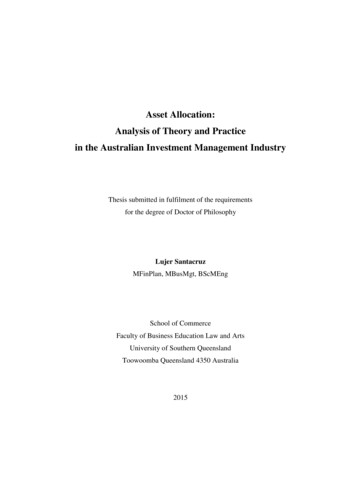
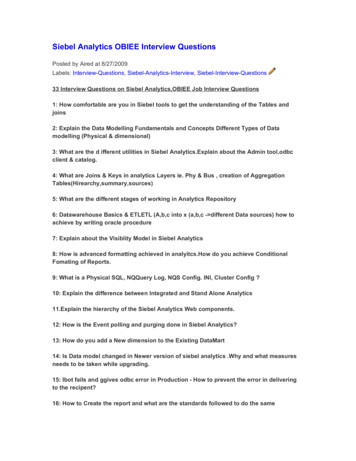
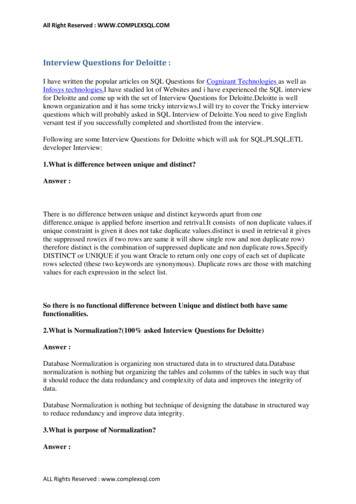
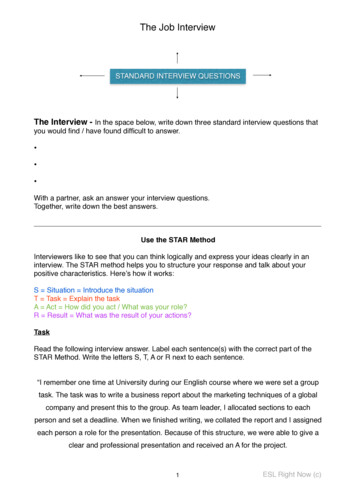
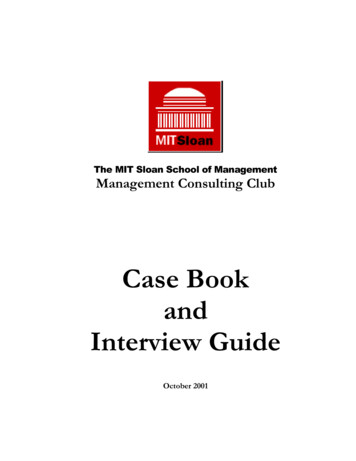

![Informatica Interview Questions and Answers [Scenario-Based]](/img/2/informatica-interview-questions-and-answers-scenario-based-1.jpg)

